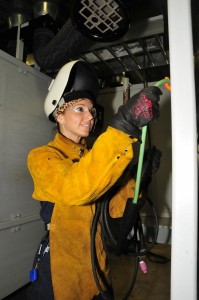Community Colleges Role in 21st Century STEM
Going over my teaching certificate and looking at the new requirements of the State of Illinois for K-12 educators, credit earned at the community college level is not accepted towards an endorsement. When this story came across my RSS feed, it affirmed my thoughts of the perception some people, and obviously state education boards, have about the quality of knowledge or skill a student attains in a community college course versus the same course in a four-year university. The idea that community college courses aren’t rigorous enough or the curriculum is watered down or the expectations and grading are much easier is a huge misconception.
So it was a pleasure to see Amber Gell, NASA Aerospace Scientist, working on her welding skills. She is enrolled in a welding program at San Jacinto College and working towards an associates degree in welding. Gell currently holds two bachelor’s degrees in aerospace engineering and aerospace studies, a master’s degree in physiology and human performance, and a graduate certificate in space systems engineering. She’s also working on a Master of Business Administration. In her own words, “I need to know about the actual work that goes into this,” said Gell. “Here in welding, it’s back to square one. Here, I’m one of the guys, not a scientist. I need to know how to identify a good weld.” She was principal investigator for NASA’s research in exothermic welding in a reduced gravity environment and understands the importance of being able to make repairs to space craft or even build habitats on Mars. In order to do this however, scientists will have to know how welding will work in a reduced gravity environment so Gell’s hands-on work in class is assisting her in her research. Read the entire article on Gell and her research.Many technical programs that once existed in high schools have been eliminated over the past ten or more years as the new education focus turned to college preparatory. My colleagues and I discussed over these years what the rationale was behind the push for all students to go to college. There are many students who can not only benefit from technical/vocational training, but it can lead to careers as well. So is it that the people making these decisions in the education community don’t understand that if everyone has a college degree and is headed into white collar professions, who is going to do the work that will be needed to upgrade/repair our country’s failing infrastructure, handle waste management, build homes and commercial structures, etc.?
There is a vocational high school down the street from where I live that just happens to be the first school I taught when I became a high school teacher. The vocational classes offered by Dunbar Vocational High School included carpentry, welding, aviation mechanics, auto shop, plumbing, painting, culinary, cosmetology, tailoring, and drafting. I still remember the huge airplane engine that sat in the south wing of the building. During the span of my career from my first job at Dunbar, the aviation program is gone. The welding, plumbing, painting, tailoring, and drafting courses are gone too. A not to kind-hearted person hit my wrought iron fence and did enough damage that a professional iron worker/welder is needed to straighten it out and join the bottom back to the side. When we first moved into the neighborhood, many of my neighbors had the welding teacher and his students put up their wrought iron fences and he would have been my first call to fix my fence. Projects like mine are good learning experiences for the students and if the class is structured to include an entrepreneurial component, the money I would pay for the repairs could go to support for the students as well as the program.
With all the interest in STEM education today, the value of having technical/vocational skills is more important than ever. Thank goodness that these programs are still available in the community colleges. Even with existing and advanced degrees, there are skills that we can acquire from community college programs. Check out technical programs at a community college near you and you might be surprised what you’ll find.





Good points. I too wonder why everyone needs to get a 4 year degree, especially when so many of these are in the humanities. It seems nuts to cut vocational & STEM programs at the high school level, and to look down on community colleges that provide these skills.